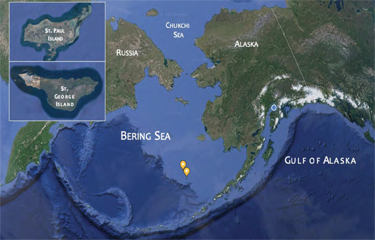The Unangax (Aleut) community of St. Paul Island has proposed the creation a new marine sanctuary around the Pribilof Islands of Alaska, with co-management between it, the community of nearby St. George Island, and the U.S. government.
The sanctuary would encompass nearly 53,000 square miles of waters, excluding a quarter-mile buffer zone around the St. George and St. Paul harbors and all shoreside and submerged industrial facilities on both islands. It would be named Alaĝum Kanuux̂ (pronounced ahl-ah-GOOM ka-NOH), meaning Heart of the Ocean, though was also been referred to as the Pribilof Islands Marine Ecosystem (or Prime) Initiative, according to the official nomination proposal, released Monday, 20 December. The community of St. George has not yet affirmed its support of the plan.
“The establishment of Alaĝum Kanuux̂ would allow conservation actions to follow our communities’ lead and ensure that tribal co-management is a central feature in the future of the Pribilof Islands marine ecosystem,” the document said.
The co-management agreement would cover northern fur seals, Steller sea lions, seabirds, crab, and halibut, with the primary goal of providing food security for those who rely upon traditional (or subsistence) harvesting of seafood, and “to advance sustainability of the nation’s fisheries through collaborative approaches to responsible management in a rapidly changing climate.”
“There is no question that the Pribilof Islands are an ecologically, socioeconomically, and culturally important area warranting a designation and inclusive management approach,” the proposal said. “A national marine sanctuary that includes the entire Pribilof Islands archipelago and introduces a new form of Indigenous co-management to the national marine sanctuaries system is necessary to meet this moment, to comprehensively and holistically conserve the ecosystems on which Unangax̂ and our neighbors and colleagues depend, to preserve our culture, and to elevate our institutions to the levels of co-equal governance. In return, the addition of the Pribilof Islands region to the NMS system will provide immeasurable benefits to our communities and the nation.”
The a sanctuary is intended to preserve and enhance existing commercial fisheries management, St. Paul tribal member and F/V Wind Dancer Captain Simeon Swetzof Jr. said.
“We are making this nomination because we need to get ahead of the changes that are happening around us but still keep our fishing economy strong,” Jr. said. “Our tribe chose this national marine sanctuary process because of its flexibility. The North Pacific council will continue to manage fisheries in this area, and that will not change. The National Marine Sanctuaries Act is crystal clear that commercial fisheries will operate in the Alaĝum Kanuux̂, and that council management will continue. My commercial fishing colleagues and I are committed to this because we know fishing will be conserved alongside our cultural resources and the ecosystem.”
“The intentional embrace of new tribal co-management principles in the governance and conservation approaches of Alaĝum Kanuux̂ reflect a truly innovative vision, in direct alignment with numerous governance principles embraced by the federal government including Indigenous and community equity, the use of traditional Indigenous ecological knowledge, and consultation with communities, fishermen, and others,” the proposal said.
The proposal said as long-term occupants and caretakers of Pribilof lands, the Unangax̂ community of St. Paul believes the sanctuary is a means to preserve its way of life and to “forge a path to a new future that values Indigenous knowledge and tribal leadership in federal policy.”
“There is an opportunity and need for truly comprehensive and integrated scientific and Indigenous knowledge-based management approaches that account for this wealth of information and consider this larger area as a critical and comprehensive unitary ecosystem with unified conservation and management needs,” the proposal said.
The proposal also calls for the study, documentation, and protection of the region’s Unangax̂ history, maritime traditions, practices, and cultural heritage, “establishing this cultural legacy and exploration of knowledge as central to the sanctuary’s research and education programs.” Human occupation and use of the islands dates back at least 4,000 years, with Russian fur traders arriving on the islands in the 18th century, and the U.S. government taking ownership of the islands in 1867 as part of its purchase of Alaska.
“The Pribilof Islands were known and used but not permanently inhabited by humans until Russian fur traders enslaved 137 Unangax̂ from the Aleutian Islands and forced them to settle on St. Paul and St. George. They became an enslaved workforce for commercial northern fur seal harvesting operations that ended in 1972 on St. George and in 1984 on St. Paul,” the proposal said. “Even though commercial sealing, and thus our original and primary cash economy, ended, our Unangax̂ communities remained. As it has been for centuries, our cultures, economies, and food security on St. Paul and St. George are inextricably tied to the health of the animals, birds, fish – the overall ecosystem and everything within it.”
Additionally, the proposal urges the promotion of tribal-led research and monitoring and collaborations with research institutions to further the use of Indigenous, traditional, and local knowledge and empirical science that will facilitate tribal-led stewardship and sciences and restore Indigenous connections to the marine ecosystem. It also calls for the implementation monitoring and analysis of the impacts that climate change on the area and the enhancement of community resilience “by ensuring that the Pribilof Islands are able to readily and quickly adapt to changing environmental and economic conditions via new approaches to education, scientific research, and Indigenous knowledge-generation.”
Image courtesy of Unangax (Aleut) community of St. Paul Island







